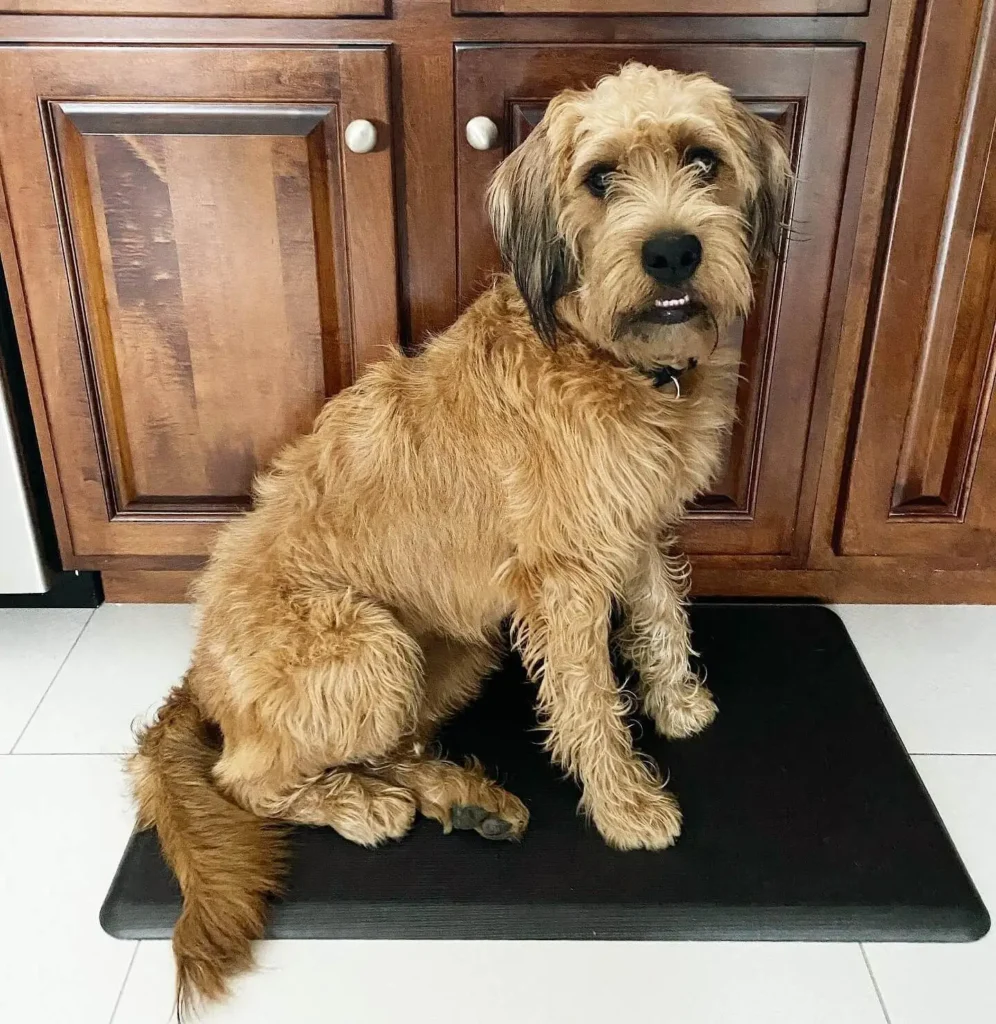The Boxer Poodle Mix also known as Boxerdoodle, a mix between the Boxer and Poodle, is a delightful hybrid pooch known for its intelligent, energetic, and playful nature. With a temperament that’s both friendly and sometimes a bit aloof with strangers, this dog makes an excellent companion and is deeply loyal to its family.
The Boxer Poodle Mix is a caring breed that thrives on human interaction and attention, making it perfect for those looking for a pet with balanced care requirements. If you’re searching for a dog that combines the best traits of two beloved breeds, the Boxerdoodle could be the perfect fit for you!
Boxer Poodle Mix Physical Attributes

The Boxerdoodle is a hybrid dog breed, mixing a Boxer with a Poodle, resulting in unique puppies that combine the best qualities of both breeds. Due to the lack of uniformity, Boxerdoodles can vary widely in appearance.
They may grow as short as 10 inches or as tall as 25 inches. Their weight can also differ significantly, ranging from a petite 12 pounds to a sturdy 70 pounds. This variety means you never quite know what you’ll get when you adopt one.
They come in an array of colors, including black, blue, brown, cream, fawn, gold, red, and white, making each Boxerdoodle distinct.
Boxerdoodles, despite their mixed heritage, are generally friendly, playful, and loyal. They inherit intelligence and devotion from their parent breeds, making them excellent family members. They are also typically calm and patient, fitting well with families with older children or people who prioritize physical activity. Their lifespan usually ranges between 10 to 12 years, giving them plenty of time to be loving companions.
What stands out about the Boxerdoodle is how well they adapt to various family dynamics. Whether in a bustling household or a quieter environment, they thrive on interaction and affection. Their playful spirit and loyal disposition make them an ideal choice for those seeking a dog that brings energy and warmth to their daily lives.
Boxer Poodle Mix Characteristics

Energy Levels
Boxerdoodles are high-energy dogs. They need plenty of mental and physical stimulation to stay happy and healthy. If they don’t get enough activity, they can become destructive or anxious. A high-energy lifestyle is essential for a Boxerdoodle.
Trainability
Boxerdoodles are generally easy-to-train. They respond well to positive reinforcement and are eager to please. However, they can also be stubborn at times, so patience and consistency are important. With proper training, a Boxerdoodle can be a well-behaved companion.
Health Considerations
As with any mixed breed, Boxerdoodles can inherit genetic health issues from their parent breeds. Potential problems include hip and elbow dysplasia, heart problems, and allergies. Regular exercise, proper nutrition, and good hygiene can help prevent these issues. It’s also important to choose a reputable breeder who screens for genetic health problems.
Lifespan
The lifespan of a Boxerdoodle can vary depending on their individual genetics. However, most Boxerdoodles can expect to live between 10 and 15 years. Some dogs may live longer, while others may have shorter lifespans due to health problems.
Socialization
Boxerdoodles are typically social dogs who enjoy being around people and other animals. However, their social behavior can vary depending on their individual temperament. Some Boxerdoodles may be more social towards humans and other dogs, while others may be more cautious or even aggressive. It’s important to socialize a Boxerdoodle from a young age to help them develop good social skills.
Boxerdoodle Breed Puppies

Finding the perfect Boxer Poodle Mix puppy is exciting, but from my own experience, it requires careful planning. This unique Boxer and Poodle mix is gaining popularity, but not all breeders are trustworthy. I discovered this the hard way when I first started my search. A backyard breeder almost scammed me by neglecting the puppy’s health.
Thankfully, I did my due diligence and switched gears, focusing on reputable and responsible breeders instead. If you’re looking, don’t rush to the first breeder you stumble upon. Research thoroughly and shortlist potential breeders who meet your standards.
Always meet in person and ask for health certificates proving their breeding dogs have been thoroughly tested before mating. This is crucial because it ensures your new pup’s well-being.
I also recommend considering adoption; sometimes, quality breeders have retired dogs that need a home. In my case, meeting the breeder and seeing their genuine care made all the difference. Always choose with care to ensure your furry friend comes from a safe and healthy environment.
Temperament & Intelligence of the Boxerdoodle
Boxerdoodles are known for being playful and super friendly dogs that love being around humans. They are a fun-loving mix that combines the best traits of both parents—the energetic nature of a Boxer and the intelligence of a Poodle.
With their highly loyal and protective nature, they often act as a watchful presence in the home, always alert and ready to be part of everything you do. Their highly active personality means they thrive on constant play and exercise, making them perfect companions for those who enjoy an athletic and playful dog.
Despite their clownish antics and being a constant source of entertainment, Boxerdoodles can sometimes be timid around strangers or prone to streaks of aggression when they feel threatened, thanks to their Boxer DNA. This mix’s naturally protective instincts make them wonderful family dogs, but they do best with proper socialization to help balance their strong personalities.
Boxerdoodles: A Family-Friendly Breed
Boxerdoodles are an incredible mix of Boxer and Poodle, making them perfect companions for active families. From my experience working with this breed, their playful nature and loving temperament truly shine, especially around children. However, their high energy levels mean they are always up for rigorous play sessions, which can be a bit much for small children who could be accidentally injured.
These dogs are best with older kids who can match their enthusiasm and love for play. I often see Boxerdoodles thrive in homes that enjoy staying active on weekends, whether it’s hiking, running, or just playing in the yard. They crave interaction and are happiest when they can bond with their family during these active moments.
Boxer Poodle Mixes and Other Pets
From my time training and observing Boxerdoodles, I’ve noticed they can get along wonderfully with other pets if they’re properly socialized and trained early. A thoughtful introduction period is key to help them live harmoniously alongside other animals.
I’ve seen them thrive in multi-pet households, where they can be just as comfortable as they are being the only pets. With the right approach, Boxerdoodles often become accepting and even protective of their furry siblings, forming bonds that enhance the dynamic of the household.
Understanding Boxerdoodle Ownership

Boxerdoodles are smart, energetic, and love to be around people. If you’re thinking about getting one, here are some things to keep in mind:
Diet and Feeding Requirements
Boxerdoodles are a hybrid dog breed that combines the energetic and playful traits of a Boxer with the intelligent and affectionate nature of a Poodle. Their unique blend of characteristics makes them popular family pets.
To ensure your Boxerdoodle lives a long and healthy life, it’s essential to provide them with a high-quality and life-stage-appropriate dog food. Consult with your veterinarian to get personalized recommendations based on your dog’s size, lifestyle, and diet.
Feeding Requirments
- Small Boxerdoodles: These dogs typically require smaller portions of food compared to their larger counterparts.
- Medium and Large Boxerdoodles: These dogs will need more substantial meals to meet their increased energy needs.
- Overfeeding: Be cautious of overeating as it can lead to weight gain and associated health problems.
- Exercise: Regular exercise is crucial for maintaining a healthy weight and preventing obesity.
Feeding by Life Stage
- Puppyhood: Puppies require a high-protein diet to support their growth and development.
- Adulthood: Adult Boxerdoodles need a balanced diet to maintain their overall health and well-being.
- Senior Years: As Boxerdoodles age, their nutritional needs may change. Consult your veterinarian for specific recommendations regarding senior-specific dog food.
Exercise
Boxerdoodles are energetic dogs who love to play. They need lots of exercise, like walking, running, or playing fetch. They also enjoy dog sports or swimming.
To keep them happy, they need at least 45 minutes of exercise every day. If they don’t get enough exercise, they might become bored or misbehave.
Boxerdoodles need a lot of space to run around. A home with a yard or easy access to a dog park is best for them.
Training
Boxerdoodles are intelligent and trainable. However, their wilful streak can sometimes make training a bit challenging. But with the right approach, training a Boxerdoodle can be a rewarding and enjoyable experience.
As a seasoned dog trainer, I’ve had the pleasure of working with many Boxerdoodles. I’ve found that the key to successful training is positive reinforcement. This means rewarding your Boxerdoodle for good behavior, rather than punishing them for bad behavior. Lenient training methods are generally more effective, as they help build a strong bond between you and your furry friend.
I’ve also learned that boredom can be a major issue for Boxerdoodles. These dogs are mentally stimulating and require plenty of interesting activities to keep them engaged. When my Boxerdoodle, Max, was a puppy, he would get bored easily. To keep him entertained, I would take him on long walks, play fetch, and teach him new tricks.
Socialization
Socialization is another important aspect of training a Boxerdoodle. Early socialization can help your puppy become more comfortable around new people and dogs. This is especially important for Boxerdoodles, as they can sometimes be aloof towards strangers. I remember taking Max to puppy socialization classes when he was young. It was a great way for him to meet other dogs and people, and it helped him become more confident.
Grooming
Boxerdoodles have curly or wavy hair. Their hair can be short or long. No matter what length, it’s important to groom them regularly to prevent mats.
Brushing is very important. This helps remove loose hair and keeps mats from forming. You should brush your Boxerdoodle’s hair at least once a week, or more often if it’s long.
Bathing is also important. Gentle shampoos and conditioners made for dogs are ideal. After bathing, make sure your Boxerdoodle is completely dry to prevent skin problems.
You can also take your Boxerdoodle to a professional groomer. A groomer who knows how to groom curly or wavy hair can help your dog look its best. They can also trim your dog’s nails and clean its ears.
Health and Care
Boxerdoodles are generally healthy dogs. But like all dogs, they can get some health problems from their parents, which are Boxers and Poodles.
Minor Problems
Boxerdoodles can have minor skin problems, like infections or allergies.
Serious Problems
Boxerdoodles can also get more serious health problems. Hip dysplasia is common in both Boxers and Poodles, so it’s important to check for this in breeding dogs. Epilepsy is another problem, but it’s less common. GDV is a very serious condition where the stomach twists. This can also affect Boxerdoodles.
Von Willebrand’s disease is a bleeding disorder. This is also common in Boxers and Poodles. It’s important to be aware of this condition and talk to your vet if your Boxerdoodle bleeds a lot.
Cancer and dilated cardiomyopathy can affect any dog. Boxerdoodles can also get these problems.
Regular vet checkups and a healthy lifestyle can help prevent many health problems.
Boxerdoodle Rescue Groups
Finding a Boxerdoodle puppy in Australia can be tough. You might try looking at rescues that help Boxers or Poodles. These places sometimes have Boxerdoodle puppies or adult dogs. Here are some rescues you can check:
Boxer Rescue Network Australia
Boxerdoodle Puppy Cost
The price of a Boxerdoodle puppy can change a lot. Good breeders usually charge between $1,000 and $3,000. But puppies with special bloodlines or colors can be more expensive. It’s important to research breeders carefully and avoid buying from backyard breeders or pet stores.
Health Testing
One good thing about mixed breed dogs like Boxerdoodles is that they’re less likely to have health problems. Good breeders should test their dogs for health problems. Common tests for Boxerdoodles include hip and elbow dysplasia, heart testing, and genetic testing for progressive retinal atrophy.
Conclusion
Boxerdoodles are great pets for families. They’re friendly, loyal, smart, and easy to train. They need regular grooming and can have some health problems, but all the good things they bring make it worth it.
If you’re thinking about getting a Boxer Poodle Mix, learn about them and meet a few puppies to find the right one. With good care and training, a Boxer Poodle Mix can be a loving and happy part of your family.


